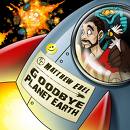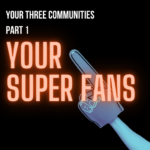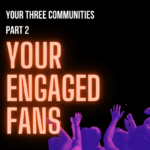 In part ii of my 1,000 true fans series I chose to interview my friend Matthew Ebel. I have known Matthew for a few years because he runs in the same geeky podcasting circles that I proudly run in. Matthew is the type of artist I refer to in my book as a “Builder” meaning Matthew is constantly pushing his career forward using not only musical innovation but also technology.
In part ii of my 1,000 true fans series I chose to interview my friend Matthew Ebel. I have known Matthew for a few years because he runs in the same geeky podcasting circles that I proudly run in. Matthew is the type of artist I refer to in my book as a “Builder” meaning Matthew is constantly pushing his career forward using not only musical innovation but also technology.What I find most striking about this interview is the fact that Matthew makes 26.3% of his net income from just 40 hard- core fans.
Imagine what it will be like for him when he gets to 1,000? The other thing that really stood out for me is the fact that an artist like Matthew (who is totally comfortable with Social Media and extremely Internet savvy) has very little idea what to do with analytics that he is gathering via Google Analytics, CrazyEgg.com, and Compete.com, as well as email stats via Blue Sky Factory.
John Wall – I’m interested in hearing how you are helping Matthew in this domain.
Here’s an excerpt from his bio:
Fully immersed in the new digital music world, Matthew is committed to being a trailblazer for other artists. “I want to leave a legacy for other musicians and show them that it’s possible to be a one man operation or a small band and do it on your own. I’m always looking for new ways to do that for myself and I’ll be letting people know where I’ve succeeded and let them know what to avoid from my failures,” he says.
Ariel Hyatt: Do you believe that 1,000 true fans is a theory that can work?
http://tinyurl.com/1000TrueFans
Matthew Ebel: Absolutely… but I honestly think you don’t need 1,000 to earn a living. 1,000 VIP subscribers at http://matthewebel.net would be enough to launch a world tour.
AH: Are you making a full-time living as a musician from your music?
ME: Yes.
AH: Can you give us a breakdown percentage wise of the following:
ME: I’ll give you exact figures for Jan-Sept 2009. Top 3 Sources will be in BOLD
Music Sales:
CD Sales – 4.1%
Digital Music Sales – 13.9%
Subscription Site – 36.9%
Live Shows – 18.1%
Cover Gig Fees/Cover – 9.8%
Original Gig Fees/Cover – 6.2%
Tips (Including UStream) – 2.1%
Works For Hire & Voiceovers – 8.2%
Affiliate Sales (typically for my own albums/tracks) – 1.1%
Licensing – 13.2%
Independent Film – 6.6%
Internet – 6.6%
Web Design – 4.6%
(I include this because I’m doing a website for a friend… it’s something I choose to do, but it is part of my income this year.)
AH: How many die hard fans, fans that will buy everything and anything from you, would you imagine that you have?
ME: At this point, about 40.
AH: How long did it take you to build up this many fans?
ME: I’d start the clock at 2005 when Beer & Coffee launched.
AH: Do you have a strategy with long-term and short-term goals in place to get to 1,000 true fans or for any future looking aspects of your music career? If so, can you share these goals?
– Hire virtual assistants to book college shows (screw agents at this point)
– Continue outreach online
– Try to educate other content providers on my subscription method
AH: Have you ever made money from social media sites like Twitter, Facebook, or Ustream? Can you please tell us exactly how and correlate them?
ME: Not directly… all these sites serve as ways to communicate new songs and new shows to existing fans, but not as a direct sales vehicle. On occasion, new fans find me via these channels, but mostly it’s done via word of mouth.
AH: Has your fame in the podcasting and online world, and your popularity with podcasters helped you to earn more money?
ME: Absolutely. By getting into podcasting when it was still shiny and new, my music was passed around a very excited community very quickly. Almost all of those people became long-term fans, making repeat purchases of my music and merchandise.
AH: What are your next steps to continue to help yourself move forward in your own career?
ME: I’m trying and get Amanda Palmer to hand my stuff off to Ben Folds. Or have me open for her on tour… 😉
AH: If you could give a band or artist any type of advice on how to start in social media, what would you advise them to do?
OK, so, six things that have made a difference for me…
(note: Matthew contributed most of these to the Indie Maximum Exposure List)
1. Stop the Musical Masturbation
I wasted so much time playing open mics and writer’s nights in Nashville and Boston. The same is true of all the “hot new music sites” that spring up every 20 minutes on the Internet. The fans do not go there, you’re only entertaining yourself. Every open mic I’ve ever seen is a room full of musicians politely waiting for their turn to get on stage. These events only introduce musicians to other musicians and offer some live performance practice. Trying to sell CD’s at an open mic is like trying to sell timeshare condos at a telemarketing convention. Fans go to Facebook or iTunes, not Stereofame. I could waste all my time playing for a crowd of other broke indie artists or I can spend my efforts approaching fans where they’re already congregating.
2. Shove Yourself Into A Niche
Music fans aren’t found on sites for music fans. I’m inspired by certain things– technology, animals, politics, sci-fi/ fantasy –and so is every other artist. Whatever I’m writing about, there’s a community based around that topic. Instead of going after generic “music fan” crowds, I chose to focus on specific niches that share MY interests. Since I’m into podcasting and new media stuff, my music has been resonating particularly well with the geek crowd. That is where I focus my efforts. I’m also a big sci-fi/ fantasy nerd as well, so I hit conventions and gatherings of that nature. Not only is my music relevant to them, I can relate to them on a personal level.
3. Get Personal
I imagine this advice won’t apply to “concept bands” that have a specific theatrical act or image, but getting personal with my fans is what keeps me alive. Good music is barely enough to get fans to hand out 99¢ anymore; they have to be emotionally invested in the artist if that artist wants their loyalty. Don’t get me wrong, there can still be a “fourth wall” during a live concert or video, but real, meaningful connection with the fans is what keeps me in their heads after the show’s over (heck, even your “character” can interact with fans in-character). I chat with my fans via Twitter, Facebook, matthewebel.com and matthewebel.net, and as many other channels as possible. The more I interact with them between performances, the more I stay fresh in their minds and the more inspiration I draw from them.
4. Keep Them Screaming Your Name
In October of 2008 I started my own subscription service– www.matthewebel.net –with no clue whether the fans would like it or not. Part of the offerings were two new songs and one live concert recording every month. It seemed like a tall order to me, but something I could accomplish. Little did I realize that new releases every two weeks would be better than any good album reviews or press coverage. Giving my fans something new to talk about every two weeks meant exactly that: they talk about me every two weeks. They’re not buying an album, raving about it, and losing interest after a few months, they’re constantly spreading my name to their Twitter followers, coworkers, pets, etc. Regular delivery of quality material is damn near my one-step panacea for the whole industry.
5. Don’t Suck
No amount of marketing can make up for a total lack of talent– this is why people don’t want to spend $20 on major label CD’s anymore. 25 years of piano and a music degree doesn’t guarantee I’ll be a success, but it gives me one hell of an advantage. I try to keep myself sharp and never assume I’m good enough. Even long-time pro football players go through spring training every year. If nothing else, I find that surrounding myself with talent raises the bar for my own ambitions. I listen to Ben Folds to inspire my production and piano abilities, I follow people like Ariel Hyatt and Amanda Palmer to improve my outreach, I keep a steady stream of Pat Monahan on my Pandora list to hear what kickass vocals sound like. I always want to be on my toes.
6. Experiment In Public
Speaking of being on my toes, I try to push my comfort level in plain sight. Sometimes I’ll produce a song in a style I’ve never really attempted before and release it to my subscribers at http://matthewebel.net –sometimes it flies, sometimes it doesn’t. My first attempt at Trance, a song called “Night Train”, has become one of the most requested songs I play at live shows now. It’s the first one people have openly talked about pirating. For something I originally downplayed as “just an experiment”, it’s now one of my biggest hits. I experiment onstage as well, trying new arrangements or even lyrics. My fans love knowing that they’re part of something spontaneous, that they’ve got a hand in shaping the very future of my music. Happy fans are vocal fans.
AH: If you had $500 to spend on marketing and promotion, how would you spend that money?
ME: I’d hire a virtual assistant to hit every influential blogger or podcaster that’s remotely related to what I’m doing and approach him or her on my behalf (based on preset talking points I’d lay out first). I would want them to interview me about what I’m doing as a small business owner AND as an artist, but any interview is an inbound link.
AH: Is there anything else you would like to say about 1,000 true fans?
ME: I’ll let you know when I get mine. Until then, 40 of them are paying 26.3% of my net income. The more I can find, the higher that percentage grows until I can spend all my time touring and writing.
AH: How do you use analytics to your advantage? What are your measurable online results, and how do your measures help you with your music career?
ME: Right now I’m tracking website stats via Google Analytics, CrazyEgg.com, and Compete.com, I also track email stats using Blue Sky Factory. Unfortunately, I have NO IDEA WHAT THESE STATS MEAN or what course of action they suggest. Fortunately a friend, John Wall, is donating his time and expertise to help me interpret this crap. I’m a musician, FFS, not an analyst!
AH: On a scale of 1 to 10, would you say you share a lot (a 10) or are you guarded in what you exposure on social media sites about yourself and your personal life?
ME: I’d say I share about 70% to 80% of my life publicly. I figure that people will just find out what I’d try to hide anyway. 🙂
AH: What would you say to a fellow musician, that thinks that Twitter is just sharing “eating a tuna sandwich” and is stupid?
ME: I’d say find a better way to communicate with your fans, then. If you can’t, maybe you should stop Twittering about your lunch and start providing useful information or social connection. If you can, why aren’t you sharing this info with the rest of us?
Find Matthew Ebel at:
http://matthewebel.com
 Get your copy of Goodbye Planet Earth at: http://matthewebel.com/store
Get your copy of Goodbye Planet Earth at: http://matthewebel.com/store
More from his bio:
For Matthew Ebel, music is the key to the journey of life, not just the destination. Whether it’s outer space adventures or a single father struggling to make a Christmas for his daughter, Matthew’s songs and stories resonate in the minds and hearts of an ever-increasing fan base. Ebel is also paving the way in the new music economy, showing that it is possible for independent artists to support themselves through their music; growing his audience by utilizing new tools available to artists.
“I want people to take my music and then go off and create something on their own,” says Matthew. “The greatest thrill for me is when people write blog posts based on my music or are inspired to do a version of one of my songs in their college choir – it’s the act of creating something new from my work. It’s amazing.”










